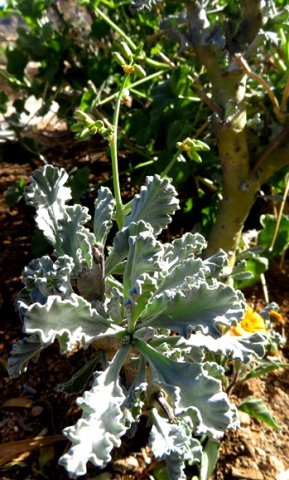Pelargonium klinghardtense

Author: Ivan Lätti
Photographer: Thabo Maphisa
Pelargonium klinghardtense is a thick-based stem succulent that bears deciduous, blue-green leaves and white flowers, referred to as a pachycaul (thick stem). It was previously known in the botanical world as P. jacobii (in 1954) and earlier P. paradoxum (in 1789, the year of the French Revolution). The current species name recognises the Klinghardt Mountains of the Sperrgebiet in southern Namibia.
The plant is commonly known in Afrikaans as the dikstingelmalva (thick stalk geranium). It develops thick and tall branches to heights around 60 cm, occasionally as tall as 1 m. Several smaller, leaf-bearing branchlets grow from the base and higher up, lending the plant the looks of a miniature tree. In picture there is a tall, thick stem at the back, a pair of greyish, stem-tip leaf rosettes in the front and between them a tall, slender, pale green flower stalk covered in the buds of tomorrow’s flowers.
The species is distributed in the north of the Richtersveld and the south of Namibia, particularly known near the mouth of the Gariep River.
The plants grow in an arid habitat, often wedged between rocks on exposed outcrops in gritty soil. The habitat population is deemed of least concern early in the twenty first century (Frandsen, 2017; Smith, et al, 2017; Le Roux, et al, 2005; iNaturalist; www.bihrmann.com; https://www.llifle.com; www.pelargonium.si; http://redlist.sanbi.org).

